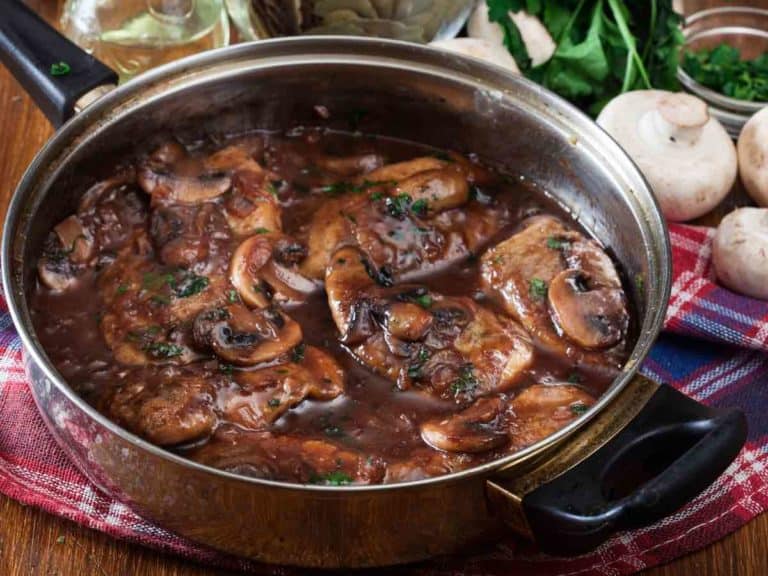Can Marsala Wine be Substituted?
Marsala wine can be served before a meal as an aperitif and after one as a digestif. Sweet Marsala is also often enjoyed as a dessert wine, commonly paired with chocolates and other decadent chocolate-based desserts.
So, in other words, it’s a versatile fortified wine. And you may be wondering if it’s just as multipurpose as a cooking wine.
One cooking wine that Marsala can be substituted for is Madeira wine. Similar to Marsala, this wine from Portugal is fortified, too. It also comes in varying levels of sweetness, from secco (dry) to dolce (sweet), just like Marsala. When substituting Marsala for Madeira in a recipe, one should use a 1:1 ratio.
Continue reading if you love cooking dishes with wine and you would like to explore the many different possibilities a bottle of Marsala can bring into your kitchen and onto the dining table, too.
I will talk about everything from wines that Marsala can replace to some of the best alcoholic and non-alcoholic alternatives to the fortified Sicilian wine. By the time you are through checking out this post, you will have the realization that Marsala wine is truly one of the most highly versatile sipping and cooking wines out there!
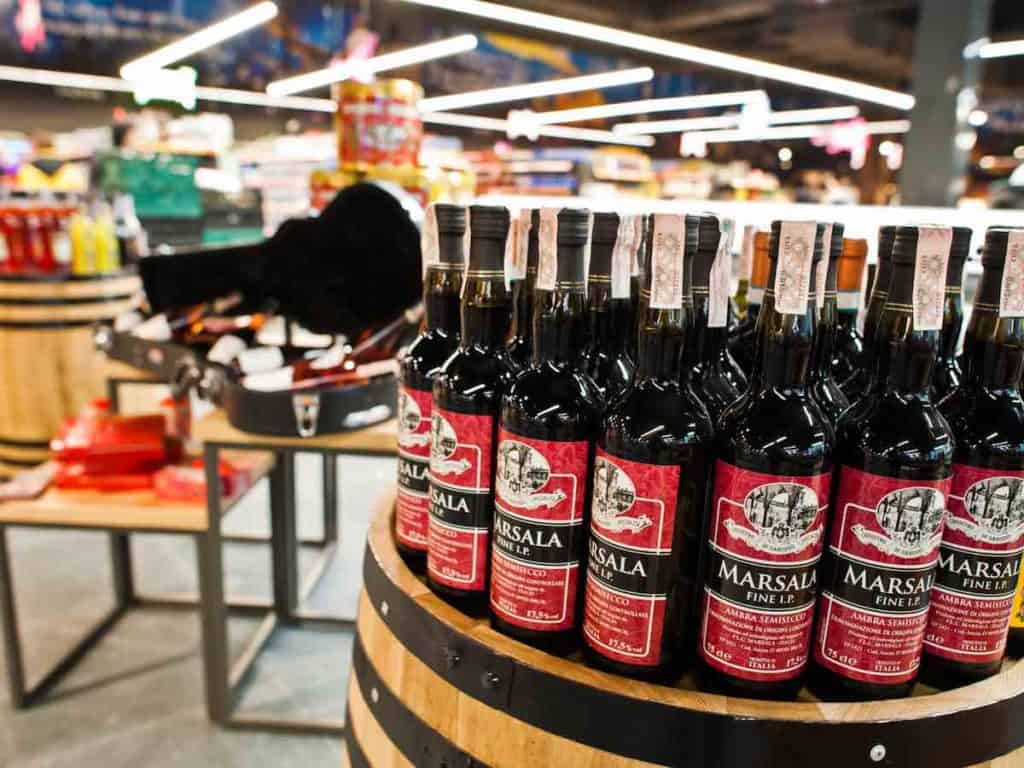
General Substitutes for Marsala Wine
Marsala wine is an excellent substitute for Madeira wine in various recipes. Naturally, Madeira makes for an excellent alternative to Marsala as a cooking wine.
Depending on what the recipe calls for, Marsala can be replaced with just about any wine having the same level of sweetness and flavor profile.
As a general rule of thumb, dry Marsala wine is best for cooking savory dishes, while sweet Marsala wine is superb for making sweet sauces and rich desserts.
Which Marsala you should opt for will depend on what you are making in the kitchen with your own hands.
Naturally, when Marsala wine isn’t available, the best substitute for it is a wine that has pretty much the same amount of sugar and kind of flavor — it’s complex yet delightful, with tasting notes of vanilla, brown sugar, stewed apricots, to name a few. And, as mentioned earlier, Madeira wine is widely considered the top substitute for Marsala.
Dry sherry is another well-known substitute for Marsala as it’s also sweet and nutty. And just like Marsala, dry sherry is also fortified with the very same spirit. And it’s none other than brandy.
Other good substitutes for Marsala include Amontillado, Moscato, sweet Riesling and Vermouth wines.
Non-Alcoholic Substitutes for Marsala
Although most of the alcohol content of Marsala wine or any other wine used for cooking evaporates when exposed to heat long enough, some people still prefer to use non-alcoholic cooking ingredients. Mixing white grape juice, sherry vinegar and vanilla results in a Marsala wine substitute that’s alcohol-free.
No matter if you are avoiding alcohol at all costs or if you don’t want to risk it since kids will be feasting on your culinary creations, too, there are a handful of alternatives to Marsala with zero or almost alcohol.
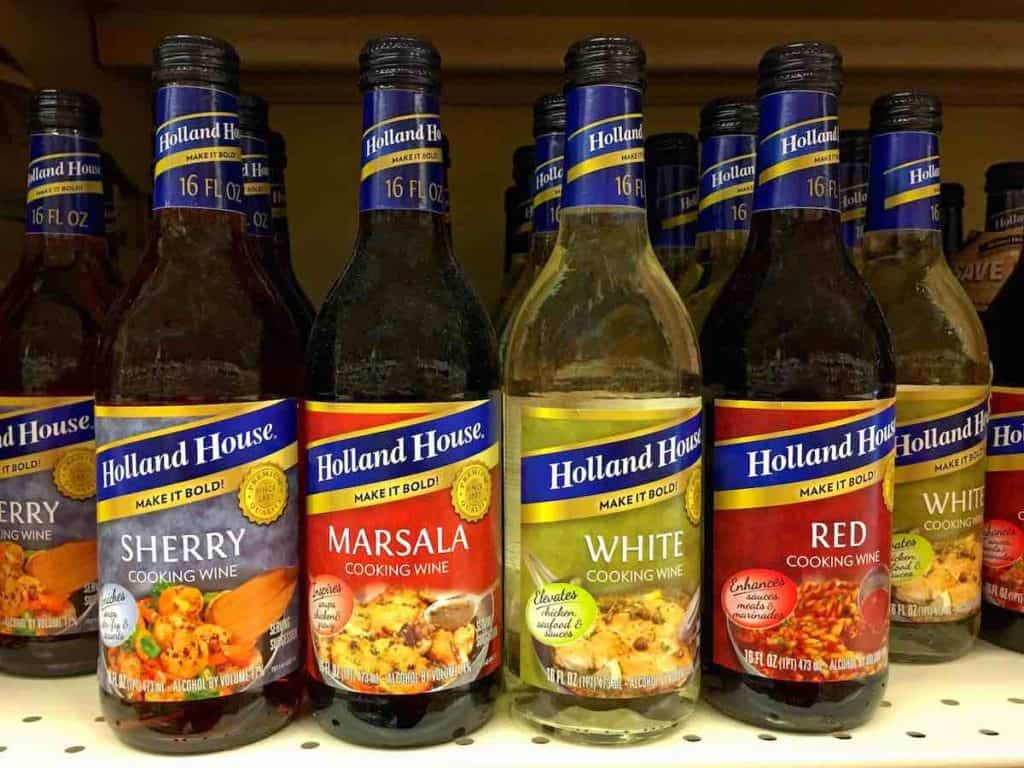
Leading the list is a recipe that requires only 3 ingredients.
All you have to do is add 2 tablespoons of sherry vinegar and 1 tablespoon of vanilla extract to every 1/4 cup of white grape juice. In case white grape juice isn’t available, feel free to use red grape juice instead. But it’s important to keep in mind that sherry vinegar has a very small amount of alcohol in it, which is going to evaporate anyway.
Some use balsamic vinegar in place of Marsala wine, countering the acidity with the help of a little brown sugar.
Adding a little balsamic vinegar to rich chicken or vegetable stock also makes for a nice alcohol-free substitute for Marsala, especially when making thick and creamy sauces.
Using Marsala Wine Instead of Marsala Cooking Wine
When the recipe calls for the addition of Marsala wine, one can use Marsala cooking wine instead. The product is manufactured to give dishes with Marsala the right flavor profile. However, since actual Marsala wine has a finer flavor and body and better overall quality, it’s more recommendable for cooking.
As the name suggests, Marsala cooking wine is a wine that’s specifically made for cooking.
One sip is all it takes for you to realize that, unlike the real deal, it’s not meant for drinking purposes. You can technically drink Marsala cooking wine — you will not die for the obvious reason that it’s non-poisonous.
However, you will not enjoy the experience as it doesn’t taste good, unlike actual Marsala wine that’s commonly enjoyed as an aperitif, digestif and dessert wine.
And that is why if you want nothing but to serve the most mouthwatering Italian or Italian-American dish with Marsala, consider whether using Marsala cooking wine is worth it.
You can substitute Marsala wine for Marsala cooking wine for cooking. But you cannot substitute Marsala cooking wine for Marsala wine for sipping or drinking.
Using Dry Marsala Instead of Sweet Marsala
Between dry Marsala wine and sweet Marsala wine, the dry one is considered the more versatile when it comes to using Italian wine for cooking. So, in other words, dry Marsala can be used as an alternative to sweet Marsala. It’s a good idea to avoid using sweet Marsala when the recipe calls for a dry Marsala.
Dry Marsala wine is commonly used for savory dishes where it can lend a nutty flavor and add some caramelization. On the other hand, sweet Marsala wine is usually reserved for thick and sweet sauces and various desserts.
Chicken Marsala, which is probably the most popular dish with the wine, uses dry Marsala.
When making pastries or desserts, don’t panic if you suddenly realize that your bottle of sweet Marsala wine is already empty. That’s because you can simply opt for dry Marsala wine instead, adjusting the recipe as necessary since dry Marsala, as what it’s called pretty much reveals, isn’t as saccharine as sweet Marsala.
But if the recipe calls for dry Marsala, you should never substitute it with sweet Marsala wine — the resulting dish will taste wrong! Instead, use a wine that has more or less the same flavor profile and dryness as dry Marsala.
Especially if you are on a tight budget, get a bottle of dry Marsala wine as it’s more versatile in the kitchen.
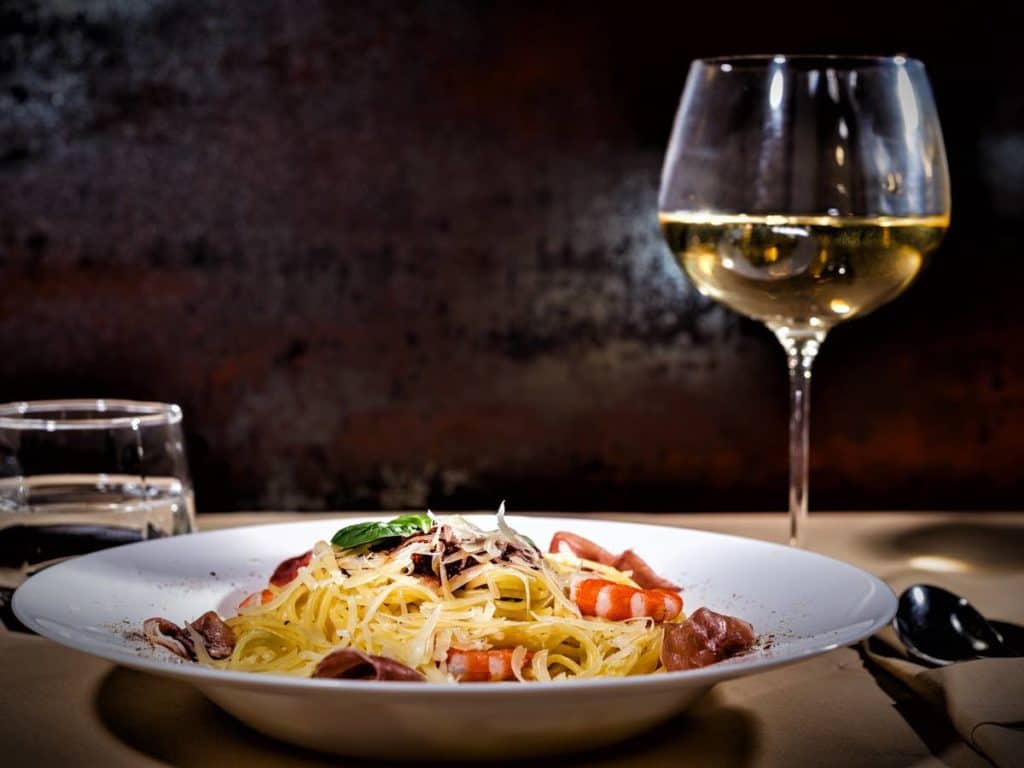
Substituting Marsala Wine for White Wine
Prior to substituting Marsala wine for white wine in cooking, check if the recipe requires dry or sweet white wine. Marsala comes in dry, off-dry and sweet varieties, which means that there is a replacement for the kind of white wine necessary. The wrong Marsala can alter the dish’s flavor slightly or substantially.
Pinot Blanc, Pinot Grigio, Pinot Gris, Sauvignon Blanc — these are some popular examples of dry white wine commonly used for cooking. Naturally, you would want to replace any of them with a dry or off-dry Marsala.
Using sweet Marsala wine as an alternative to the dry cooking wines mentioned above is a total no-no.
But feel free to use semi-sweet to sweet Marsala wine if the recipe calls for the use of sweet white wine. Some common examples are Chenin Blanc, Moscato, Riesling and White Port.
When using Marsala wine instead of white wine, it’s also important to consider alcohol content.
The average alcohol content of white wine can range anywhere from 5% to 14%. On the other hand, the average alcohol content of Marsala wine is from as low as 15% to as high as 20%. Generally speaking, fortified wines such as Marsala tend to pack more alcohol due to the fact that they have added spirits.
With a higher alcohol content, you might want to cook the dish a little longer or stir it more often than necessary in order to make most of the alcohol go away.
Substituting Marsala Wine for Red Wine
Various red wines used for cooking an assortment of dishes possess more or less the same flavor profile as Marsala. Therefore, Marsala wine can be used as a replacement for the red wine a recipe requires. Many agree that Marsala is closest to the flavor of Madeira, which is also a fortified wine like Marsala.
Many red wines used for cooking can be replaced with Marsala wine.
One very good example is Pinot Noir — it has a slightly sweet flavor just like semi-secco Marsala, which is also known as off-dry or semi-sweet Marsala.
Adjusting the recipe has to be done if you are using another type of Marsala. For instance, add a little sugar if what you have is secco Marsala, which is the least sweet of all Marsala wines, as Pinot Noir is sweeter. On the other hand, use less Marsala if the available one is dolce, which is the sweetest among all Marsala options.
But Marsala wine is often substituted for Madeira wine, which, as mentioned earlier, has a flavor that’s very much similar to that of Marsala.
And since Madeira is fortified just like Marsala, it has a high alcohol content, too: 18% to 20%. It goes without saying that the resulting dish pretty much tastes the same whether Madeira or Marsala is used.
You can also use Marsala wine in place of dark sherry, Port or Vermouth for cooking purposes.
Using Marsala Wine for Making Sauces
Many Italian and Italian-American veal and chicken dishes with thick and sweet sauces often require the use of Marsala wine. The fortified Sicilian wine adds a fruity and nutty flavor to sauces. Besides sweet sauces, many savory recipes also call for the use of Marsala wine, in particular the dry or off-dry variety.
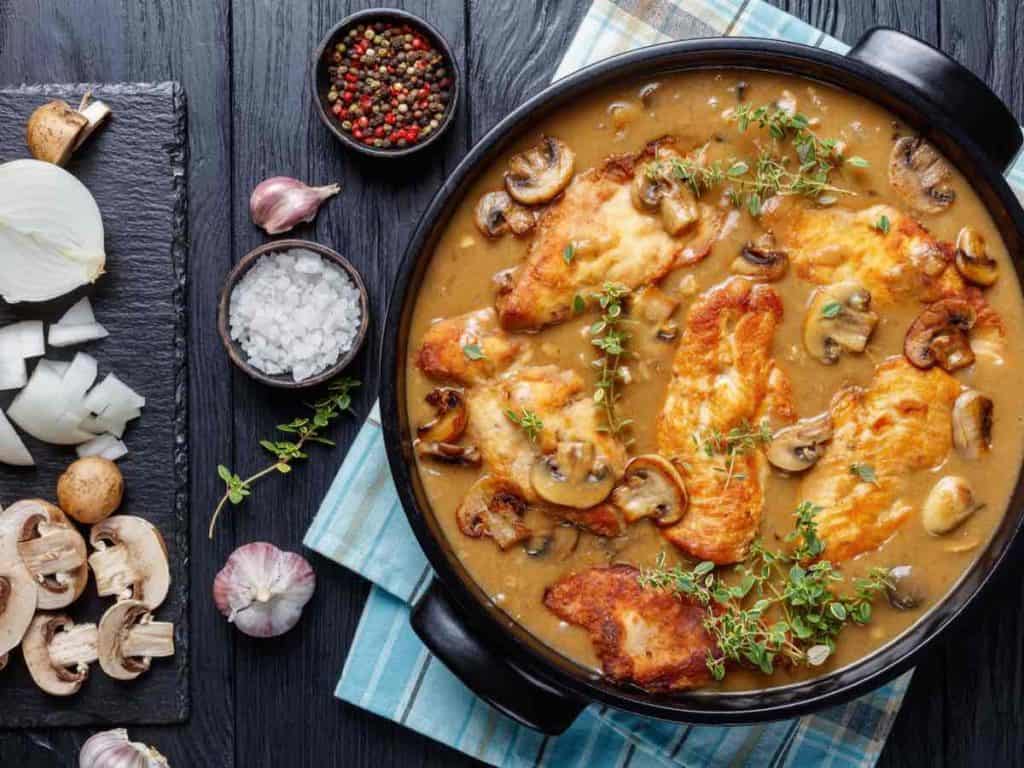
If the dish has a rich and creamy sauce and is Italian or Italian-American in nature, chances are that it can taste so much better with a little Marsala wine.
Professional chefs and casual cooks often count on Marsala when creating caramelized sauces.
Of course, one of the most popular uses for Marsala is for cooking chicken Marsala, which is pan-fried chicken cutlets and some mushrooms in a luxurious Marsala wine sauce.
The Italian wine can be used, too, for making the sauces of various beef and veal dishes. As a matter of fact, some recipes call for its use in giving risotto a velvety sauce!
Aglio e olio, alfredo, amatriciana, bolognese, carbonara, marinara, pesto, ragu — these are some spaghetti sauces you can cook with Marsala to give them a more compounded flavor.
Using Marsala Wine for Baking
Both dry and sweet Marsala wines can be used for baking. However, sweet Marsala is the baking ingredient used almost always for the fact that it has a sweeter flavor and a more viscous consistency. It’s possible to use sweet Marsala wine as a substitute for white and red wine for baking purposes.
Using Marsala for baking is like using almond slash vanilla extract — not only does the Sicilian wine add sweetness but also intensifies and enhances the flavor and smell of an assortment of baked goods.
And not only can it be added to dough and mixes but also incorporated into fillings, frostings and glazes.
Chocolate cakes, cupcakes, brownies, truffles, cookies, gingerbread, pies — these are just some of the many different baked products that Marsala wine can be incorporated into. As mentioned earlier, sweet Marsala is preferred for baking due to the fact that it has a higher sugar content than dry Marsala, which amounts to over 100 grams per liter.
Madeira is one of the most commonly used wines for baking purposes. And in case this sweet Portuguese wine isn’t available in the kitchen, feel free to reach for a bottle of sweet Marsala instead.

Using Marsala Wine for Making Desserts
Marsala wine, in particular dolce or sweet Marsala, is often served as a dessert wine. As a matter of fact, it pairs well with all kinds of chocolate desserts. Marsala wine can also be used for making an assortment of desserts. There are a lot of Italian desserts where the sweet Italian wine can be added to.
Short-aged wines such as sweet Marsala are some of those that make for the best wines alongside desserts.
Anything from tiramisu, apple pie to biscotti pairs so well with Marsala. The same is true for chocolate and other rich and decadent chocolate-based desserts as they tend to bring out the best in one another.
The flavor of sweet Marsala is anything but basic. It’s admired for its being sweet and nutty and the possession of stewed apricot, brown sugar, honey, toffee, vanilla and tamarind flavors. And since it has a high sugar content, the presence of sweet Marsala can help make rich desserts slightly richer, which can spell a world of difference!
As Marsala is from Sicily, it doesn’t come as a surprise why it can be incorporated into many Italian desserts.
Buccellato, cannoli, cassata, granite, pandolce, panettone, panforte, panna cotta, pignolata, tiramisu, zabaione — these are just some desserts from Italy that, in most instances, taste better with sweet Marsala.
Frequently Asked Questions (FAQs) on Marsala Use
Before we bring this post to an end, I will answer some of the most pressing questions about using Marsala as a cooking wine — see which of the following are on your mind and waiting to be answered:
Can I substitute Marsala for red wine vinegar?
Marsala wine can be used in recipes where red wine vinegar is needed. The right one for the job is off-dry Marsala as sweet Marsala may add too much sweetness to the dish. When using sweet Marsala as a replacement, reduce the amount the recipe requires.
Can Marsala wine substitute for cognac?
Cognac is added to enrich sauces and compound the flavor of both savory and sweet dishes. Dry Marsala wine can be used in place of cognac, although one will have to use more to obtain the same effect. Meanwhile, mixing cognac with white grape juice results in a Marsala alternative.
Can you use brandy in place of Marsala wine?
While brandy is used to fortify Marsala, it may lend a too strong taste in recipes where Marsala is required. This is why brandy should be diluted with white grape juice beforehand until its flavor profile comes very close to that of Marsala wine.
Can you use Marsala wine for shrimp scampi?
Dry white wine is what’s used in classic shrimp scampi recipes. Some of those that are commonly employed by professional chefs are Pinot Grigio, Sauvignon Blanc and unoaked chardonnay. Dry Marsala wine can be used instead of any other dry white wine when making shrimp scampi.
Can you use Marsala wine instead of garam masala?
Marsala is a fortified wine from Sicily. On the other hand, garam masala is a blend of ground aromatic spices originating from India. Needless to say, one cannot be substituted for the other as they are completely different cooking ingredients with different uses.
Can you use old Marsala wine for cooking?
Once opened, a bottle of Marsala wine lasts for 4 to 6 months. While it may still be consumed past the given timeframe, it will not have the same flavor and overall quality. Cooking with old Marsala wine may keep you from achieving the flavor profile the dish is supposed to have.
Can you use Marsala wine in a pressure cooker?
In order to avoid running the risk of burning down the kitchen, avoid putting a lot of Marsala or any other wine in the pressure cooker. But it’s considered safe if the recipe calls for burning off some of the alcohol first, such as sauteing the ingredients beforehand.
Conclusion
Whether used as a sipping beverage or cooking ingredient, Marsala can prove to be one highly versatile wine.
So much so that it can be used as a substitute for as well as substituted with all kinds of cooking wines. Provided that you use a wine with practically the same level of sweetness and flavor profile, a disastrous culinary result can be avoided.
Above, we talked about all kinds of substitution-related topics about Marsala in cooking.
Keep the things you have read about in mind each time you wish to try an Italian or Italian-American recipe on the internet and failure to impress your palate and that of your family and friends should not be a concern.


